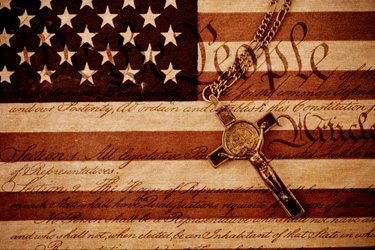Congress, Abortion, and the Separation of Church and State
The abortion debate is, at heart, a debate over church-state separation.

The abortion debate is, at heart, a debate over church-state separation.
Take Rep. Daniel Lipinski (D-IL). Responding to the U.S. Conference of Catholic Bishops’ urgings for immigration reform, Lipinski, a Roman Catholic, said last month that he listens to the arguments of bishops and priests in his district, but he considers their opinions on immigration to be less binding than on other matters. “There are some issues that the church speaks authoritatively on, such as abortion, in protecting life,” Lipinski told the New York Times. As for national immigration policy, “There are prudential judgments that are made, informed by Catholic theology, but it’s not something that Catholics are required to follow.” On immigration, the bishops in his district merely “inform.” On abortion, those bishops speak “authoritatively,” and he is “required to follow.”
Lipinski sees nothing wrong in exploiting a public office by enshrining his understanding of his faith. And he is not the first to do so. During the Affordable Care Act (ACA) debates of 2010, former Rep. Dale Kildee (D-MI) eventually supported the bill—but only after his parish priest’s reassurance that a vote for the measure would not jeopardize his place in the hereafter: “I will be 81 years old in September. Certainly at this point in my life, I’m not going to change my mind and support abortion, and I’m not going to risk my eternal salvation,” he told the Times. His personal stake secured, Kildee voted in favor of the bill.
Former Rep. Bart Stupak (D-MI) voted against the ACA, despite the urgings of nuns and other Catholics. Stupak said on Hardball, “With all due respect to the nuns, when I deal or am working on right-to-life issues, we don’t call the nuns. I mean, we deal with right-to-life. We deal with the U.S. Conference of Catholic Bishops.” When it came to regulating women’s health, Stupak gave his bishops final say.
As a rabbi, I feel as strongly as any religious leader about my faith and national policy. But in contrast to the bishops and others, clergy from many different denominations uphold the morality in protecting women as they make decisions about their bodies and their health, in consultation with their doctors and anyone else to whom they decide to speak—loved ones, trusted friends, counselors, or clergy. We believe that, once a woman decides, she should be able to get the medical care she believes is right for her. Judaism, along with other faiths, affirms that a woman’s pregnancy has a moral standing, but her moral standing and her ability to come to an informed conclusion holds higher ground. What’s more, as a pastor, I can say that women approach this decision seriously—as seriously as you or I might approach any significant decision. What is more, I know that when a woman is convinced that her pregnancy is not right for her, she will do whatever she needs to do to end it, and no sermon will convince her otherwise. So there is great wisdom in respecting her decision, and ensuring that abortion stays legal and women get safe care.
We religious people disagree about all kinds of things, including God, the Bible, and public policy. Like everybody else, we have a right to “inform” the public, but none of us speaks so “authoritatively” that policymakers must automatically honor our demands. Rather, in a land where religion and faith are separate, as they should be, Congress must not play religious favorites by elevating the teachings of any one faith—in this case, the most restrictive, or their own—above the teachings or conscience of others. Instead, policymakers are to establish an atmosphere that allows competing and conflicting religious interpretations to stand side-by-side, to protect men and women as they honor faith and conscience, determine the course of their lives, and plan their families. What is more, as Lipinski, Kildee, and Stupak must know, their bishops do not represent their faithful: Catholic women rely on birth control and legal abortion in roughly the same proportions as everyone else.
The debate about abortion is really a debate about the relationship between religion and government. Abortion opponents are open about their intentions to trample church-state boundaries. It would be wise to take their threats at face value and recognize that they have sway. It would be equally wise to protect women as they come to their own conclusions and receive medical care.
